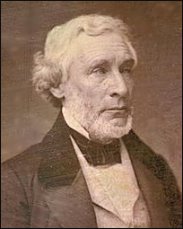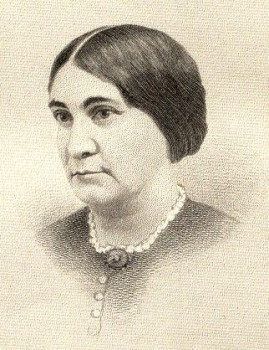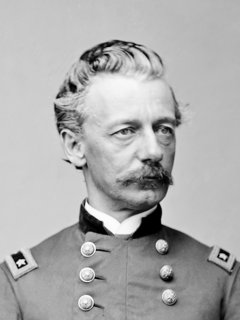 September 1, 1795: James Gordon Bennett, founder of the New York Herald, which became the country’s most influential and the world’s largest newspaper; perhaps best known for his sensational and often startling coverage of scandalous “news,” Bennett’s Herald also covered – with great detail and accuracy – some of the greatest fires in the history of New York, including the Great Fire of 1835; in 1869, Bennett donated money to the “Metropolitan Fire department”(predecessor of the FDNY) to create a medal honoring extraordinary valor of a firefighter; the award known as the James Gordon Bennett Medal remains today the senior medal awarded posthumously to members of the FDNY who die in the line of duty; born in Newmill, Scotland; died in New York City, 1872.
September 1, 1795: James Gordon Bennett, founder of the New York Herald, which became the country’s most influential and the world’s largest newspaper; perhaps best known for his sensational and often startling coverage of scandalous “news,” Bennett’s Herald also covered – with great detail and accuracy – some of the greatest fires in the history of New York, including the Great Fire of 1835; in 1869, Bennett donated money to the “Metropolitan Fire department”(predecessor of the FDNY) to create a medal honoring extraordinary valor of a firefighter; the award known as the James Gordon Bennett Medal remains today the senior medal awarded posthumously to members of the FDNY who die in the line of duty; born in Newmill, Scotland; died in New York City, 1872.
 September 1, 1798: Richard Delafield, Civil war general who also served as U.S. Military Academy superintendent and Chief of the Corps of Engineers of the United States Army; formed the “Delafield Commission” (1855) and sent by then-Secretary of War Jefferson Davis to Europe to observe the European military; in charge of New York Harbor defenses 1861-1864; born in New York City; died in Washington, D.C., 1873.
September 1, 1798: Richard Delafield, Civil war general who also served as U.S. Military Academy superintendent and Chief of the Corps of Engineers of the United States Army; formed the “Delafield Commission” (1855) and sent by then-Secretary of War Jefferson Davis to Europe to observe the European military; in charge of New York Harbor defenses 1861-1864; born in New York City; died in Washington, D.C., 1873.
 September 4, 1824: Phoebe Cary, poet and leader of the “Cary Salon,” a New York cultural circle that met weekly in her home and attracted women’s rights advocates Susan B. Anthony and Elizabeth Cady Stanton, writer Fanny Fern, reformer Horace Greely, newspaperman Robert Bonner, and showman P.T. Barnum – who described Phoebe as the “wittiest woman in America;” New York; born in Mt. Healthy (near Cincinnati), Ohio; died in Newport, Rhode Island, 1871.
September 4, 1824: Phoebe Cary, poet and leader of the “Cary Salon,” a New York cultural circle that met weekly in her home and attracted women’s rights advocates Susan B. Anthony and Elizabeth Cady Stanton, writer Fanny Fern, reformer Horace Greely, newspaperman Robert Bonner, and showman P.T. Barnum – who described Phoebe as the “wittiest woman in America;” New York; born in Mt. Healthy (near Cincinnati), Ohio; died in Newport, Rhode Island, 1871.
September 6, 1812: Samuel Dickinson Burchard; obscure pastor from the Houston Street Presbyterian Church, whose attack on the Democrats as the party of “Rum, Romanism, and Rebellion” during the last days of the presidential campaign of 1884 backfired, and is said to have turned the election in favor of Democratic candidate Grover Cleveland; born, Steuben, New York; died in 1891 in Saratoga, New York.
 September 15, 1783: Luther Bradish, diplomat, New York lieutenant governor (1839-1842) and speaker of the Assembly, president of the New-York Historical Society (1850-1863) and the American Bible Society; born in Cummington, Massachusetts; died in Newport, Rhode Island, 1863.
September 15, 1783: Luther Bradish, diplomat, New York lieutenant governor (1839-1842) and speaker of the Assembly, president of the New-York Historical Society (1850-1863) and the American Bible Society; born in Cummington, Massachusetts; died in Newport, Rhode Island, 1863.
September 22, 1831: Theodore Roosevelt, Sr., a New York philanthropist and father of the 26th President of the United States, his namesake, Teddy Roosevelt; died in New York City, 1878.
 September 24, 1827: Henry Warner Slocum, Civil War general, severely wounded at the First Bull Run, he commanded the extreme right flank of the Union Army at Gettysburg and the Army of Georgia after it joined Sherman for the March to the Sea; after the war, Slocum returned to Brooklyn where he practiced law and was active in civic affairs: he was elected three times to Congress; he served as president of the Brooklyn Board of City works; was a member of the Gettysburg Monument Commission; served as a member of the board of trustees of the Brooklyn Bridge – where he pushed to make it toll-free; and served as president of the Coney Island and Brooklyn Railroad Company; born in Delphi, New York; died in Brooklyn, 1894.
September 24, 1827: Henry Warner Slocum, Civil War general, severely wounded at the First Bull Run, he commanded the extreme right flank of the Union Army at Gettysburg and the Army of Georgia after it joined Sherman for the March to the Sea; after the war, Slocum returned to Brooklyn where he practiced law and was active in civic affairs: he was elected three times to Congress; he served as president of the Brooklyn Board of City works; was a member of the Gettysburg Monument Commission; served as a member of the board of trustees of the Brooklyn Bridge – where he pushed to make it toll-free; and served as president of the Coney Island and Brooklyn Railroad Company; born in Delphi, New York; died in Brooklyn, 1894.
September 30, 1824: Samuel Sullivan Cox, Congressman who represented both Ohio and New York; elected speaker of the House of Representatives in 1876; also served as Ambassador to the Ottoman Empire; a supporter of civil service reform, Cox was honored in 1891 by U.S. Post Office employees who raised $10,000 to build a statue in his honor in Tompkins Square Park in gratitude for his support for paid benefits and a 40-hour work-week; born in Zanesville, Ohio; died in New York City 1889.